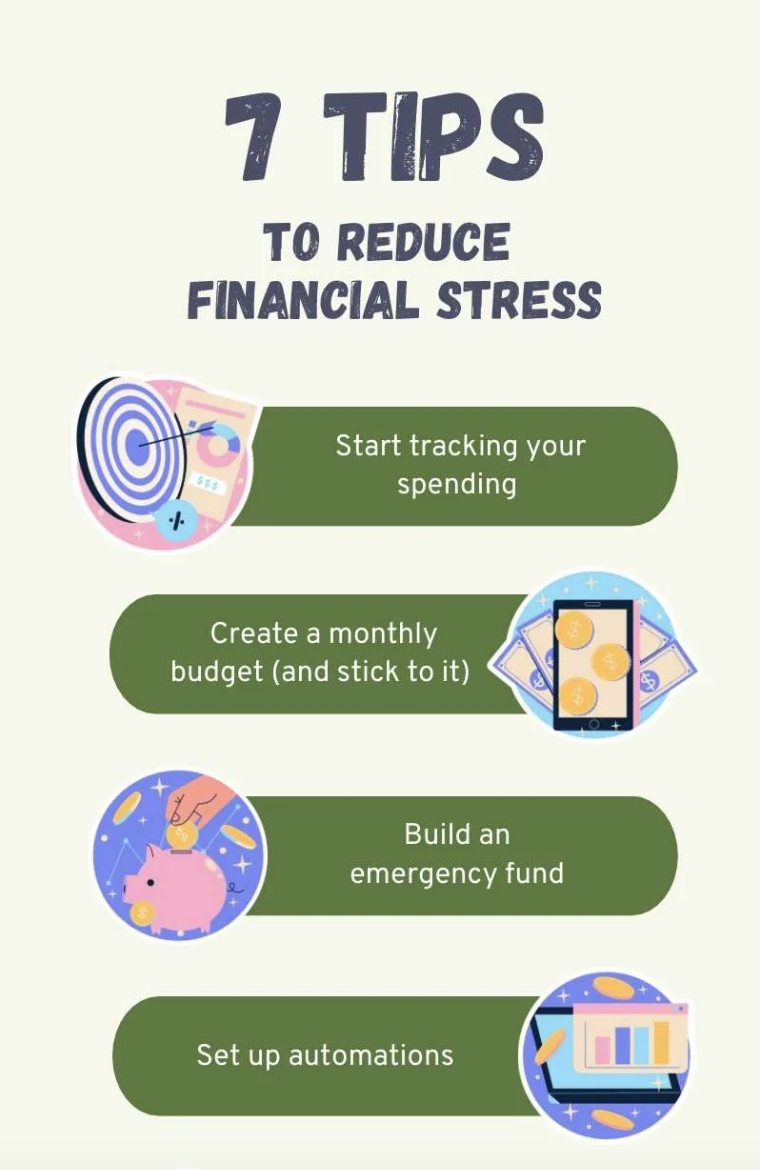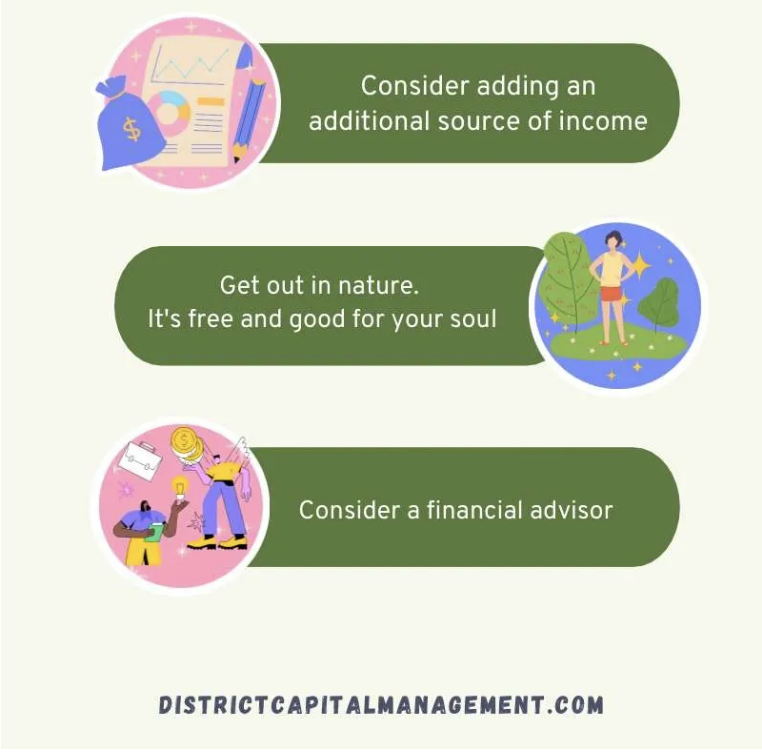These Related Stories
7 Tips To Reduce Financial Stress
Share this

5.5 MIN READ
With rising inflation, many Americans are experiencing financial stress. This can make it hard to live the life that you want to live. Having a plan to help manage the financial stress can help improve your overall outlook. Here are seven top tips to reduce your financial stress. Our team of financial planners also give their own personal advice.
What is financial stress?
Financial stress is a constant worry about money. It can severely impact your mental and physical health. According to a recent study, a substantial number of adults in the United States between the ages of 21 and 62 felt anxiety and stress about their personal finances well before the COVID-19 pandemic. Another recent study showed that one-third of Americans are experiencing financial stress.
What Can Cause Financial stress?
Money is one of the most universal sources of stress. Financial stress can come from something that is likely to be short term such as losing your job or having a large unexpected expense, or it can also be long term such worrying if you have enough money for retirement. No matter what the cause is of your financial stress, it can really take a toll on your body.
What Does Financial Stress Do to Your Body?
Most people stress about money from time to time but it can become problematic when it disrupts your everyday life. Dealing with financial stress can impact your relationships, mental health, and physical health. It can have a very real impact on your body.
Whenever you are stressed then your body goes into “flight or fight” mode and releases adrenaline and cortisol into the bloodstream. If this remains elevated then financial stress can cause many problems such as increased blood pressure, increased heart rate, sleep issues, weight gain, headaches, and more.
This is why it’s important to take control of your finances and reduce your financial stress. The saying is true: health is wealth! If you experience any side effects due to your financial stress then it’s important to talk to a healthcare professional.


How Can I Relieve Financial Stress (7 Tips)?
1. Start Tracking Your Spending
Have you ever wondered where all of your money is going? Tracking your spending is a great way to find out. This will enable you to see which expenses are essential, if there are any expenses that you can cut, and if there is any money that you can save. You might be able to cut your daily Starbucks or a streaming subscription you’re not using. By tracking your spending, it will help empower you. Once you know where your money is going, then you know you can do something about it.
2. Create a Monthly Budget (and Stick to it)
Tracking your spending means that you can create a monthly budget. If you don’t already have a monthly budget in place then now is a great time to start. Having a budget means that you will reduce the likelihood of overspending and it will also feel good knowing that you are sticking to your plan.
There are so many apps and tools that you can use to create a budget such as Mint or YNAB. You can also use pen and paper, your journal, or a spreadsheet. It doesn’t need to be complicated. While creating a budget can cause some additional stress at the start, once you have a budget and know where your money is going each month, it puts you back in charge of your money.
3. Build an Emergency Fund
Building an emergency fund to cover unexpected expenses can make you feel more financially secure. If you lose your job or need to pay a large medical bill, having money in an emergency fund will help reduce the financial stress. You don’t want to be in a situation where you are adding financial stress on top of an already stressful situation. You want peace of mind and an emergency fund can provide that.
If you have any debt, then you may want to start with a smaller emergency fund. Try to find somewhere in your budget where you can put away $100 a month. This will quickly add up over the year. Once you are consumer debt-free, we typically recommend an emergency fund amount of 3-6 months worth of essential expenses. How much you want to save is entirely up to you. The goal is to reduce your financial stress.
4. Set Up Automations
- Savings: Setting up automated saving transactions is a great way to “force” savings. It can help reduce the likelihood of spending that money on unnecessary items. You will feel good knowing that your savings are growing with each paycheck.
- Bills: You can also set up automatic payments for your bills. This will reduce your financial stress about missing a bill and it will also save you time. It’s important to still keep track of your bills to ensure that they are the same amount that you budgeted for.
5. Consider Adding an Additional Source of Income
You can only cut your budget so far, and sometimes a tight budget can cause additional stress. Adding an additional source of income means that there will be more money coming in to cover your expenses.
There are a variety of ways that you can add an additional source of income. Ask for a raise from your boss. You can also see if you can work a couple more hours for your current job if you earn an hourly wage. Try getting a consulting gig on the side, or make YouTube videos. However, be realistic with your time and make sure that you take care of yourself.
6. Get Out in Nature
Take a brief walk outside. Spending just 20 minutes in nature can reduce your stress. You could go for a hike, take the kids to the playground, or go relax at the beach or lake. It’s free and the fresh air is good for the soul! Spending time in nature is not only good to reduce your stress, but it also reduces anxiety and boosts your feeling of happiness.
7. Consider a Financial Advisor
Sometimes financial problem-solving can be too big to handle on your own. It can also cause a lot of stress trying to work out what the best financial strategy is for your unique situation. A financial planner can help you identify your financial challenges and opportunities, and create a long-term saving and investing strategy. This will help address your current financial needs and plan for the future. Knowing that you have a financial expert overseeing your financial situation can help you feel more in control of your financial future.
Below are some personal tips to reduce financial stress from our team of financial advisors here at District Capital Management.
Kayla Welte – CFP®, ChFC®, AFC®
- Have a Plan: plan for today, plan for your short-term goals, plan for your long-term goals, and plan for emergencies.
- Automate savings and payments, including extra debt payments.
- Know where your money is going, how much comes in, and how much is spent each month.
- Hire a professional.
- Automate as much as possible.
- Commit to a “financial moment” every month (with your partner if applicable).
- Reflect if resources are going towards “what’s most important”.
Manage Your Finances to Reduce Financial Stress
Financial stress is real but don’t let it consume your life. The best way to reduce your financial stress is to understand your current situation, create a budget, and then make incremental improvements that address your biggest worries.
 About the Author
About the Author
Alvin Carlos, CFP®, CFA is the founder of District Capital Management, an independent, fee-only financial planning firm. He helps professionals and entrepreneurs in their 30s and 40s elevate their finances and maximize their money.
Did you know XYPN advisors provide virtual services? They can work with clients in any state! View Alvin's Find an Advisor profile.
Share this
- Good Financial Reads (924)
- Financial Education & Resources (892)
- Lifestyle, Family, & Personal Finance (865)
- Market Trends (114)
- Investment Management (109)
- Bookkeeping (55)
- Employee Engagement (32)
- Business Development (31)
- Entrepreneurship (29)
- Financial Advisors (29)
- Client Services (17)
- Journey Makers (17)
- Fee-only advisor (12)
- Technology (8)
Subscribe by email
You May Also Like

What's Your Favorite Financial Podcast?

6 Financial Planning Myths Debunked

